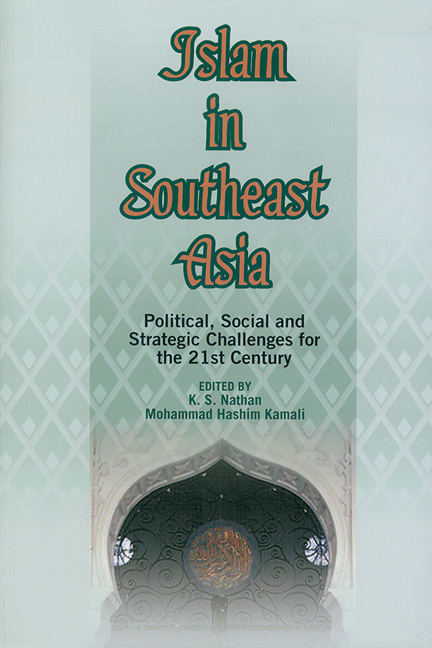Book contents
- Frontmatter
- Contents
- Preface
- Introduction: Understanding Political Islam Post-September 11
- PART ONE ISLAMIC DOCTRINE, HISTORY, GROWTH AND INSTITUTIONS IN SOUTHEAST ASIA
- PART TWO POLITICS, GOVERNANCE, CIVIL SOCIETY AND GENDER ISSUES IN SOUTHEAST ASIAN ISLAM
- 6 Islam Embedded: ‘Moderate’ Political Islam and Governance in the Malay World
- 7 Law-Making in the Name of Islam: Implications for Democratic Governance
- 8 Is It Always Islam versus Civil Society?
- 9 Islamization, Civil Society and Religious Minorities in Malaysia
- 10 Islam and Gender: Reading Equality and Patriarchy
- PART THREE MODERNIZATION, GLOBALIZATION AND THE ‘ISLAMIC STATE’ DEBATE IN SOUTHEAST ASIA
- PART FOUR IMPACT OF SEPTEMBER 11 ON ISLAMIC THOUGHT AND PRACTICE
- CONCLUSION: Addressing the Challenge of Political Islam in Southeast Asia
- Note on Contributors
- About the Editors
- Index
7 - Law-Making in the Name of Islam: Implications for Democratic Governance
from PART TWO - POLITICS, GOVERNANCE, CIVIL SOCIETY AND GENDER ISSUES IN SOUTHEAST ASIAN ISLAM
Published online by Cambridge University Press: 03 November 2017
- Frontmatter
- Contents
- Preface
- Introduction: Understanding Political Islam Post-September 11
- PART ONE ISLAMIC DOCTRINE, HISTORY, GROWTH AND INSTITUTIONS IN SOUTHEAST ASIA
- PART TWO POLITICS, GOVERNANCE, CIVIL SOCIETY AND GENDER ISSUES IN SOUTHEAST ASIAN ISLAM
- 6 Islam Embedded: ‘Moderate’ Political Islam and Governance in the Malay World
- 7 Law-Making in the Name of Islam: Implications for Democratic Governance
- 8 Is It Always Islam versus Civil Society?
- 9 Islamization, Civil Society and Religious Minorities in Malaysia
- 10 Islam and Gender: Reading Equality and Patriarchy
- PART THREE MODERNIZATION, GLOBALIZATION AND THE ‘ISLAMIC STATE’ DEBATE IN SOUTHEAST ASIA
- PART FOUR IMPACT OF SEPTEMBER 11 ON ISLAMIC THOUGHT AND PRACTICE
- CONCLUSION: Addressing the Challenge of Political Islam in Southeast Asia
- Note on Contributors
- About the Editors
- Index
Summary
INTRODUCTION: ISLAM AS A POLITICAL IDEOLOGY
The rise of political Islam in countries throughout the Muslim world has posed particular challenges to democratic principles of governance, human rights and women's rights.Most Muslim states are in crisis today, politically, economically, socially. Many remain under authoritarian rule of wellentrenched monarchs, despots, and autocratic elected leaders. The fact that the modern Muslim state is conceptualized and organized within the framework of modern political institutions which are regarded as western and secular, the state failure to deliver on the aspirations of the people is seen as the failure of these Western political models and processes. As they become delegitimized in the eyes of the discontented, disenfranchized and marginalized groups of society, the reactive search for an alternative governing ideology in Muslim countries often takes the form of religiosity. In these societies, Islamist activists have become the most vocal and effective opponents to the ruling elite as they successfully construct and package religion into an ideology for political struggle against the oppressive state.
The political ideals of Islamism (Islam used as a political ideology) have found widespread appeal among disparate social forces in Muslim societies — young urbanites, upwardly mobile professionals adrift from tradition and culture, the underclass left behind by the new prosperity and modernization agenda, and socially conscious citizens outraged by the corruption, mismanagement, and authoritarianism of the ruling elite and see no hope for change. Harnessing these discontentments, political Islamists whose objective is to topple the existing political order and replace it with an Islamic order, have crafted and packaged religion into an appealing political ideology of protest and resistance. The complexity and depth of religion is reduced to one fixed ideological worldview to determine and direct public behaviour. This worldview is constructed in opposite to an ideological enemy and the world is then interpreted based on these opposites.
The ideology is moulded into a set of dichotomies, presented as the:
Divine order vs. secular order
Islamic state (no separation between religion and politics) vs secular nation-state (separation between religion and politics)
Consultation (shura) vs. secular democracy
Divine law vs. human legislation
Sovereignty of God's rule on earth vs. sovereignty of the people
This packaged ideology made up of clear and unambiguous messages is then presented as the true authentic face of faith and piety where there is no separation between religion and politics.
- Type
- Chapter
- Information
- Islam in Southeast AsiaPolitical, Social and Strategic Challenges for the 21st Century, pp. 121 - 134Publisher: ISEAS–Yusof Ishak InstitutePrint publication year: 2005

